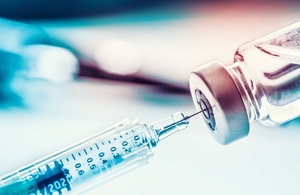MHRA authorises bispecific antibody therapy Tepkinly as a treatment for diffuse large B-cell lymphoma in adults
Patients with recurring lymphoma, or who have not responded to prior treatments, could access a new bispecific antibody therapy to help treat their condition.

The Medicines and Healthcare products Regulatory Agency (MHRA) has today authorised a new medicine called Tepkinly (epcoritamab), a treatment for diffuse large B-cell lymphoma (a type of blood cancer) in adults.
It can be used to treat patients when the cancer has returned after previous treatment, or who have not responded to at least two previous treatments.
Diffuse large B-cell lymphoma is a type of non-Hodgkin lymphoma, a cancer that develops in the lymphatic system, a network of vessels and glands spread throughout the body that contain infection-fighting white blood cells known as lymphocytes.
Tepkinly is given by a doctor or nurse as an injection under the skin in 28-day cycles, with patients staying in hospital for 24 hours after the first full dose to monitor for side effects.
The active ingredient in this treatment, epcoritamab, is a bispecific antibody. This is a type of protein designed to recognise and attach to a specific target substance in the body, helping a patient’s immune system fight cancer.
In this case, it has been designed to help a patient’s immune system to attack cancer (lymphoma) cells by attaching to both their immune cells and cancer cells, bringing them together, so that their immune system can destroy the cancer cells.
The most common side effects of the medicine are cytokine release syndrome (a condition associated with medicines that stimulate the T-cells of the immune system), pneumonia, headache, nausea, diarrhoea, vomiting, injection site reactions, fever, tiredness, pain in the belly area and swelling.
As with any medicine, the MHRA will keep the safety and effectiveness of Tepkinly under close review. Anyone who suspects they are having a side effect from this medicine are encouraged to talk to their doctor, pharmacist or nurse and report it directly to the Yellow Card scheme, either through the website or by searching the Google Play or Apple App stores for MHRA Yellow Card.
Notes to editors
-
The Medicines and Healthcare products Regulatory Agency (MHRA) is responsible for regulating all medicines and medical devices in the UK by ensuring they work and are acceptably safe. All our work is underpinned by robust and fact-based judgements to ensure that the benefits justify any risks.
-
The MHRA is an executive agency of the Department of Health and Social Care.
-
The Marketing Authorisation was granted on 20 October 2023 to AbbVie Ltd.
-
More information can be found in the Summary of Product Characteristics and Patient Information leaflets which will be published on the MHRA Products website within 7 days of approval.
-
For more information on Non-Hodgkin lymphoma, please refer to the NHS webpage.
-
For media enquiries, please contact the newscentre@mhra.gov.uk, or call on 020 3080 7651 (Mon-Fri 08:30-17:00) or 07770 446 189 (outside office hours).
Updates to this page
-
Epcoritamab is a bispecific antibody, not a monoclonal antibody. The amendment has been made throughout the press release.
-
First published.